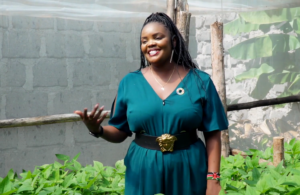After a retrenchment in the real estate industry, Wangari Kuria chose to relocate to a quieter town south of Nairobi. Now she is the face – and founder – of a business that trains small-scale farmers not just in Kenya, but around the world.

It is mid-morning in Kitengela, in Kajiado County, south of Nairobi and Wangari Kuria’s farm is buzzing with activity.
A group of 40 would-be farmers are being given an introduction to mushroom farming by Kuria. They have gathered from all parts of the country.
Kuria is the Founder and CEO of Farmer on Fire Ltd, an organization that provides farming skills for farmers in Africa, especially women.
“My focus is empowering small-scale farmers because I’m a small-scale farmer. When we say youth and women should get more into agriculture, they don’t have a lot of assets, hence this training helps,” she explained.
Kuria was born and raised in Nyahururu, Nyandarua County, famous for its agricultural productivity with crops including maize, beans, Irish potatoes, cabbages, spinach, kale, and peas grown in the area to fertile soils and favourable climate.
Fed by nutrient-rich volcanic soils, Kenya’s fresh vegetables are exported around the world.
After unexpectedly losing her job in the real estate industry, she moved out of Nairobi to reduce her living expenses.
According to the Federation of Kenya Employers, the country’s unemployment rate stands at 12.7%, with the youth demographic (15-34 years old) constituting 35% of the population, experiencing the highest unemployment rate at 67%.
Kuria says she decided to go back to her farming roots because she knew 80% of Kenya’s agricultural production is by farmers working with small pieces of land.
“Interestingly I was never meant to be a farmer. It’s just that life went south, I was retrenched, I found myself in Kitengela, and I didn’t have a way to create an income, or spend my day so I just had to do what I knew best,” she remembered.
She soon realised there was a gap in the market for indigenous vegetables.
“I got a very good market and it encouraged me to keep going and to keep expanding. I would go to my neighbors and say, ‘Can I use your piece of land? I’ll make sure it’s not grabbed.’ I would fence, put some drips, and grow some crops,” she explained.
Being a graduate of United States International University Africa (USIU), Kuria’s classmates were very interested in learning how she was growing crops, so she started posting clips on social media. She also started her YouTube page, Farmer on Fire, which now contains over 300 videos.
“My friends would ask me, ‘Wangari, you are able to grow food, how do you do it? I also want to learn how to grow food.’ That is when I started shooting small clips for them in the farm, narrating my story, trying to look interesting,” she said.
Being an urban farmer, with a small space, Kuria focuses mainly on high-value crops such as oyster and button mushrooms, strawberries, black soldier fly larvae, eucalyptus, Azolla, and dragon fruits. She dries much of her produce with solar dryers and packages them into different products.
“My focus is on empowering small-scale farmers because I am a small-scale farmer. When we say youth should get more into agriculture, women should get more into agriculture, these are people who do not hold any assets,” she said.
Kurai not only grows high-value crops, but she also trains farmers and aspiring farmers. She offers online sessions on Telegram and monthly on-farm training. She charges 2000 shillings (US$13) for online training and 4850 shillings (US$33) for on-farm training. She has trained over 12,000 people through her online training and 2,400 people through lessons conducted on her farm.
“One of our biggest priorities and product is in training, we offer training, especially mushroom training where we teach people how to grow those mushrooms. We give them ready bags, where they don’t even need to have the training, they just go start spraying and they can start harvesting immediately,” she explained.
Kuria has also travelled the world as a voice for other farmers. She has been heavily involved in activism, speaking on behalf of small-scale farmers. She has travelled to South Africa, Paris, China, the USA and other countries.
“From the training, (what) I’ve learned is you don’t have to start big, it’s about growing from one step to another,” said Elizabeth Gathoni, one of Kuria’s trainees.
In 2023, Kuria won the Global Citizen Prize, an accolade that honours activists and advocates for their proactive efforts in making positive contributions to their communities.
Kuria has also helped address challenges faced by women-led agribusinesses in her community.
During a dry spell in early 2023, Kuria helped women in Kitengela plant mushrooms. This helped them to supplement their nutrition and when harvested, she helped sell some of the mushrooms, providing the women with extra income.
Kuria’s farm is fully sustainable. She is conscious about growing plants that don’t end up being eaten. Any agricultural waste is recycled to make manure or provides food for BSL (Black Soldier Fly Larvae) or mushrooms. She has an underground tank where she harvests and reserves over 10,000 litres of water.
“We want to change the narrative, we want to make farming the way they say it. We want to make it ‘sexy’. We want to show that there is money in this, actually for the young people,” said Kimiti Wa Gitau, an agricultural show host and consultant.
Kuria is now taking her experiences and knowledge to another level as an author. She has written two books namely, “How to Start Farming – A Guide from Small Scale to Profit Making Agribusiness”, and “This Girl is on Fire”. She is currently working on her third book.
Credit: bird story agency
